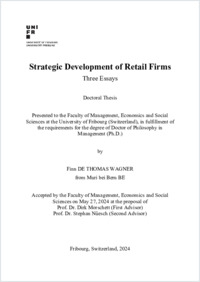Strategic development of retail firms : three essays
SPR
- de Thomas Wagner, Finn
- Morschett, Dirk (Degree supervisor)
- Fribourg (Switzerland), 2024
1 ressource en ligne (182 pages) ; 1 fichier pdf
Thèse: Université de Fribourg (Suisse), 2024
English
All firms face intense pressure to ensure their long-term competitive success – the constant development of their organisations is key. This is particularly important in the retail industry that is characterised by low margins, intense competition, and evolving consumer preferences. Internationally active retailers can, for instance, develop their organisations by entering new markets or by divesting from foreign subsidiaries, allowing them to shift their focus to the most promising markets. Retailers can also shape their organisations in such a way that innovation can take place in an effective manner, allowing the retailer to develop its business in promising areas. This thesis comprises three studies which contribute to the scholarly understanding of how retail firms can develop their organisations to secure their long-term success.
Study 1 concerns ‘retail divestment’. It uses an embedded case-study methodology to investigate the drivers that lead to 32 market exits among the 50 largest grocery retailers in Europe between 2014 and 2018. The study shows that for most of the exits included in the dataset, combinations of drivers at the subsidiary, host-country and parent levels had a joint effect on market exit decisions taken by retailers. Using a configurational approach, the study identifies a series of combinations of market exit drivers that occur repeatedly in the dataset. Based on these, the study develops five archetypes of combinations that can be used to explain the exits in the dataset.
Study 2 and 3 both concern ‘retail innovation’; however, they examine separate research streams. Study 2 uses a qualitative multiple-case study approach to investigate the strategic fit between innovation management techniques and the dimensions of innovation in retail among European retailing companies. The study identifies the matching criteria linking innovation management techniques and dimensions of innovation in retail to show which techniques are suitable for developing innovation in which dimensions. Based on these matching criteria, the study develops twelve testable propositions as its core theoretical contribution.
Study 3 uses a qualitative multiple-case study approach to investigate the complex collaboration dynamics that occur both within retailing firms, but primarily those that occur between retailing firms and external stakeholders. The study identifies and develops seven different types of factors that either impede or foster collaboration within a sample of five retailing firms. Additionally, the study discusses the findings in the context of extant literature concerning inter-organisational collaboration. The identification of these seven factors in the study lays the groundwork for additional research contributing to what remains an under-researched field. The study also furthers knowledge concerning how successful collaborations could be designed, which is pivotal to enabling innovation in the highly competitive retail industry.
The thesis concludes by stating that there is still significant room for additional research in all three research streams that the study presents in the overall context of the development process retailers must necessarily engage in to remain competitive.
Study 1 concerns ‘retail divestment’. It uses an embedded case-study methodology to investigate the drivers that lead to 32 market exits among the 50 largest grocery retailers in Europe between 2014 and 2018. The study shows that for most of the exits included in the dataset, combinations of drivers at the subsidiary, host-country and parent levels had a joint effect on market exit decisions taken by retailers. Using a configurational approach, the study identifies a series of combinations of market exit drivers that occur repeatedly in the dataset. Based on these, the study develops five archetypes of combinations that can be used to explain the exits in the dataset.
Study 2 and 3 both concern ‘retail innovation’; however, they examine separate research streams. Study 2 uses a qualitative multiple-case study approach to investigate the strategic fit between innovation management techniques and the dimensions of innovation in retail among European retailing companies. The study identifies the matching criteria linking innovation management techniques and dimensions of innovation in retail to show which techniques are suitable for developing innovation in which dimensions. Based on these matching criteria, the study develops twelve testable propositions as its core theoretical contribution.
Study 3 uses a qualitative multiple-case study approach to investigate the complex collaboration dynamics that occur both within retailing firms, but primarily those that occur between retailing firms and external stakeholders. The study identifies and develops seven different types of factors that either impede or foster collaboration within a sample of five retailing firms. Additionally, the study discusses the findings in the context of extant literature concerning inter-organisational collaboration. The identification of these seven factors in the study lays the groundwork for additional research contributing to what remains an under-researched field. The study also furthers knowledge concerning how successful collaborations could be designed, which is pivotal to enabling innovation in the highly competitive retail industry.
The thesis concludes by stating that there is still significant room for additional research in all three research streams that the study presents in the overall context of the development process retailers must necessarily engage in to remain competitive.
- Faculty
- Faculté des sciences économiques et sociales et du management
- Language
-
- English
- Classification
- Economics
- Notes
-
- Bibliographie
- License
- Open access status
- gold
- Identifiers
-
- SWISSCOVERY 991171889313305501
- DOI 10.51363/unifr.eth.2024.015
- URN urn:nbn:ch:rero-002-122084
- Persistent URL
- https://folia.unifr.ch/unifr/documents/328672
Statistics
Document views: 468
File downloads:
- deThomasWagnerF: 868
